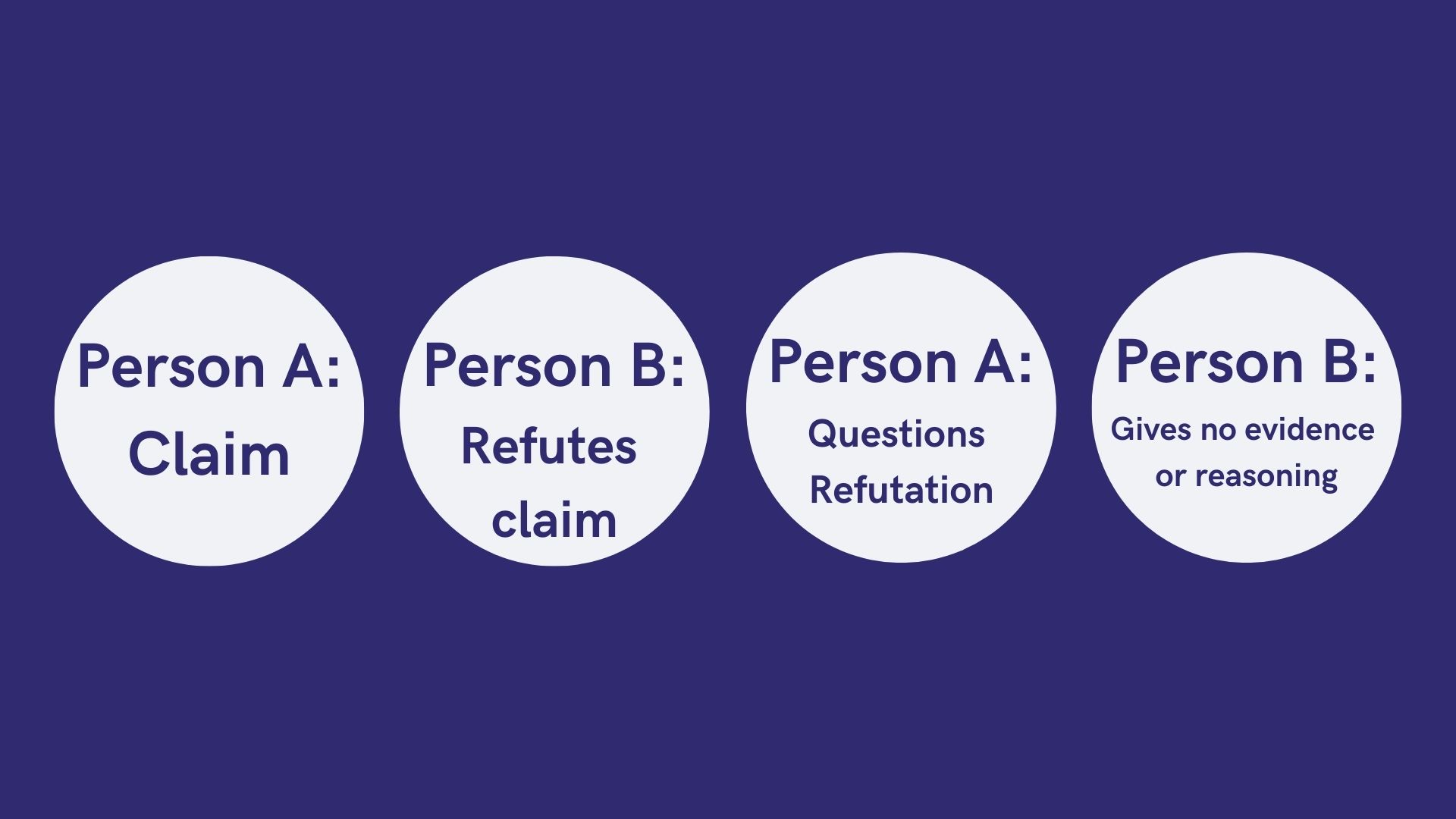|
Proof By Assertion
Proof by assertion, sometimes informally referred to as proof by repeated assertion, is an informal fallacy in which a proposition is repeatedly restated regardless of contradiction and refutation.Austin J. Freeley, David L. Steinberg, ''Argumentation and Debate; Critical Thinking for Reasoned Decision Making'' (Wadsworth Cengage Learning, Boston, 2009), p. 196 The proposition can sometimes be repeated until any challenges or opposition cease, letting the proponent assert it as fact, and solely due to a lack of challengers ('' argumentum ad nauseam''). In other cases, its repetition may be cited as evidence of its truth, in a variant of the appeal to authority or appeal to belief fallacies. This fallacy is sometimes used as a form of rhetoric by politicians, or during a debate as a filibuster. In its extreme form, it can also be a form of brainwashing. Modern politics contains many examples of proofs by assertion. This practice can be observed in the use of political slogans, and t ... [...More Info...] [...Related Items...] OR: [Wikipedia] [Google] [Baidu] |
Informal Fallacy
Informal fallacies are a type of incorrect argument in natural language. The source of the error is not just due to the ''form'' of the argument, as is the case for formal fallacies, but can also be due to their ''content'' and ''context''. Fallacies, despite being incorrect, usually ''appear'' to be correct and thereby can seduce people into accepting and using them. These misleading appearances are often connected to various aspects of natural language, such as ambiguous or vague expressions, or the assumption of implicit premises instead of making them explicit. Traditionally, a great number of informal fallacies have been identified, including the fallacy of equivocation, the fallacy of amphiboly, the fallacies of composition and division, the false dilemma, the fallacy of begging the question, the ad hominem fallacy and the appeal to ignorance. There is no general agreement as to how the various fallacies are to be grouped into categories. One approach sometimes fou ... [...More Info...] [...Related Items...] OR: [Wikipedia] [Google] [Baidu] |
Big Lie
A big lie (german: große Lüge) is a gross distortion or misrepresentation of the truth, used especially as a propaganda technique. The German expression was coined by Adolf Hitler, when he dictated his book ''Mein Kampf'' (1925), to describe the use of a lie so colossal that no one would believe that someone "could have the impudence to distort the truth so infamously." Hitler claimed that the technique had been used by Jews to blame Germany's loss in on German general Erich Ludendorff, who was a prominent nationalist political leader in the Weimar Republic. According to historian Jeffrey Herf, the Nazis used the idea of the original big lie to turn sentiment against Jews and justify the Holocaust. Herf maintains that Joseph Goebbels and the Nazi Party actually used the big lie technique that they describedand that they used it to turn long-standing antisemitism in Europe into mass murder. Herf further argues that the Nazis' big lie was their depiction of Germany as an inn ... [...More Info...] [...Related Items...] OR: [Wikipedia] [Google] [Baidu] |
Informal Fallacies
Informal fallacies are a type of incorrect argument in natural language. The source of the error is not just due to the ''form'' of the argument, as is the case for formal fallacies, but can also be due to their ''content'' and ''context''. Fallacies, despite being incorrect, usually ''appear'' to be correct and thereby can seduce people into accepting and using them. These misleading appearances are often connected to various aspects of natural language, such as ambiguous or vague expressions, or the assumption of implicit premises instead of making them explicit. Traditionally, a great number of informal fallacies have been identified, including the fallacy of equivocation, the fallacy of amphiboly, the fallacies of composition and division, the false dilemma, the fallacy of begging the question, the ad hominem fallacy and the appeal to ignorance. There is no general agreement as to how the various fallacies are to be grouped into categories. One approach sometimes found ... [...More Info...] [...Related Items...] OR: [Wikipedia] [Google] [Baidu] |
Woozle Effect
The Woozle effect, also known as evidence by citation, occurs when a source is widely cited for a claim it does not adequately support, giving said claim undeserved credibility. If replication studies are not done and no one notices that a key claim was never well-supported in its original publication, faulty assumptions may affect further research. The Woozle effect is somewhat similar to circular reporting in journalism, where someone makes a questionable claim, a journalist unthinkingly accepts it and republishes it not realizing its dubious and unreliable origins, and other journalists and the public continue to repeat and duplicate the unsupported claim. Origin and definition A Woozle is an imaginary character in the A. A. Milne book ''Winnie-the-Pooh'', published in 1926. In chapter three, "In which Pooh and Piglet Go Hunting and Nearly Catch a Woozle", Winnie-the-Pooh and Piglet start following tracks left in snow believing they are the tracks of an imaginary animal ca ... [...More Info...] [...Related Items...] OR: [Wikipedia] [Google] [Baidu] |
On Bullshit
''On Bullshit'' is a 2005 book (originally a 1986 essay) by American philosopher Harry G. Frankfurt which presents a theory of bullshit that defines the concept and analyzes the applications of bullshit in the context of communication. Frankfurt determines that bullshit is speech intended to persuade without regard for truth. The liar cares about the truth and attempts to hide it; the bullshitter doesn't care if what they say is true or false, but cares only whether the listener is persuaded.''On Bullshit'' (2005), by Harry Frankfurt. p. 61. Frankfurt's philosophical analysis of bullshit has been analyzed, criticized and adopted by academics since its publication. History Frankfurt originally published the essay "On Bullshit" in the '' Raritan Quarterly Review'' journal in 1986. Nineteen years later, the essay was published as the book ''On Bullshit'' (2005), which proved popular among lay readers; the book appeared for 27 weeks on ''The New York Times'' Best Seller list, ... [...More Info...] [...Related Items...] OR: [Wikipedia] [Google] [Baidu] |
Ipse Dixit
''Ipse dixit'' ( Latin for "he said it himself") is an assertion without proof, or a dogmatic expression of opinion.Whitney, William Dwight. (1906)"''Ipse dixit''" ''The Century dictionary and cyclopedia,'' pp. 379–380; Westbrook, Robert B"John Dewey and American Democracy", p. 359 The fallacy of defending a proposition by baldly asserting that it is "just how it is" distorts the argument by opting out of it entirely: the claimant declares an issue to be intrinsic, and not changeable.VanderMey, Randall ''et al.'' (2011)''Comp'', p. 183 excerpt: "Bare assertion. The most basic way to distort an issue is to deny that it exists. This fallacy claims, 'That's just how it is.' " History The Latin form of the expression comes from the Roman orator and philosopher Marcus Tullius Cicero (106–43 BC) in his theological studies ''De Natura Deorum'' (''On the Nature of the Gods'') and is his translation of the Greek expression (with the identical meaning) ''autòs épha'' (), an arg ... [...More Info...] [...Related Items...] OR: [Wikipedia] [Google] [Baidu] |
Denialism
In the psychology of human behavior, denialism is a person's choice to denial, deny reality as a way to avoid a psychologically uncomfortable truth. Denialism is an essentially irrational action that withholds the validation of a historical experience or event when a person refuses to accept an empirically verifiable reality. In the sciences, denialism is the rejection of basic facts and concepts that are undisputed, well-supported parts of the scientific consensus on a subject, in favor of ideas that are radical, controversial, or fabricated. The terms ''Holocaust denial'' and ''AIDS denialism'' describe the denial of the facts and the reality of the subject matters, and the term ''climate change denial'' describes denial of the Scientific opinion on climate change, scientific consensus that the climate change of planet Earth is a real and occurring event primarily caused in geologically recent times by human activity. The forms of denialism present the common feature of the per ... [...More Info...] [...Related Items...] OR: [Wikipedia] [Google] [Baidu] |
Circular Reasoning
Circular may refer to: * The shape of a circle * ''Circular'' (album), a 2006 album by Spanish singer Vega * Circular letter (other) ** Flyer (pamphlet), a form of advertisement * Circular reasoning, a type of logical fallacy * Circular reference * Government circular, a written statement of government policy See also * Circular DNA (other) * Circular Line (other) Circle Line or circular line is an expression commonly used to describe a circle route in a public transport network or system. Circle Line or Circular line may also refer to: Railways Asia Bangladesh * Chittagong Circular Railway China ... * Circularity (other) {{disambiguation ... [...More Info...] [...Related Items...] OR: [Wikipedia] [Google] [Baidu] |
Argumentum Ad Lapidem
Appeal to the stone, also known as argumentum ad lapidem, is a logical fallacy that dismisses an argument as untrue or absurd. The dismissal is made by stating or reiterating that the argument is absurd, without providing further argumentation. This theory is closely tied to proof by assertion due to the lack of evidence behind the statement and its attempt to persuade without providing any evidence. Appeal to the stone is a logical fallacy. Specifically, it is an informal fallacy, which means that it relies on inductive reasoning in an argument to justify an assertion. Informal fallacies contain erroneous reasoning in content of the argument and not the form or structure of it, as opposed to formal fallacies, which contain erroneous reasoning in argument form. Example : Speaker A: Infectious diseases are caused by tiny organisms that are not visible to unaided eyesight. : Speaker B: That is not true. : Speaker A: Why is it not true? : Speaker B: It's obviously ridiculous. Sp ... [...More Info...] [...Related Items...] OR: [Wikipedia] [Google] [Baidu] |
Argumentum Ad Nauseam
' is a Latin term for an argument or other discussion that has continued to the point of nausea. For example, "this has been discussed '" indicates that the topic has been discussed extensively and those involved have grown sick of it. The fallacy of dragging the conversation to an ''ad nauseam'' state in order to then assert one's position as correct due to it not having been contradicted is also called ' ( to infinity) and argument from repetition. The term is defined by the '' |



.jpg)
